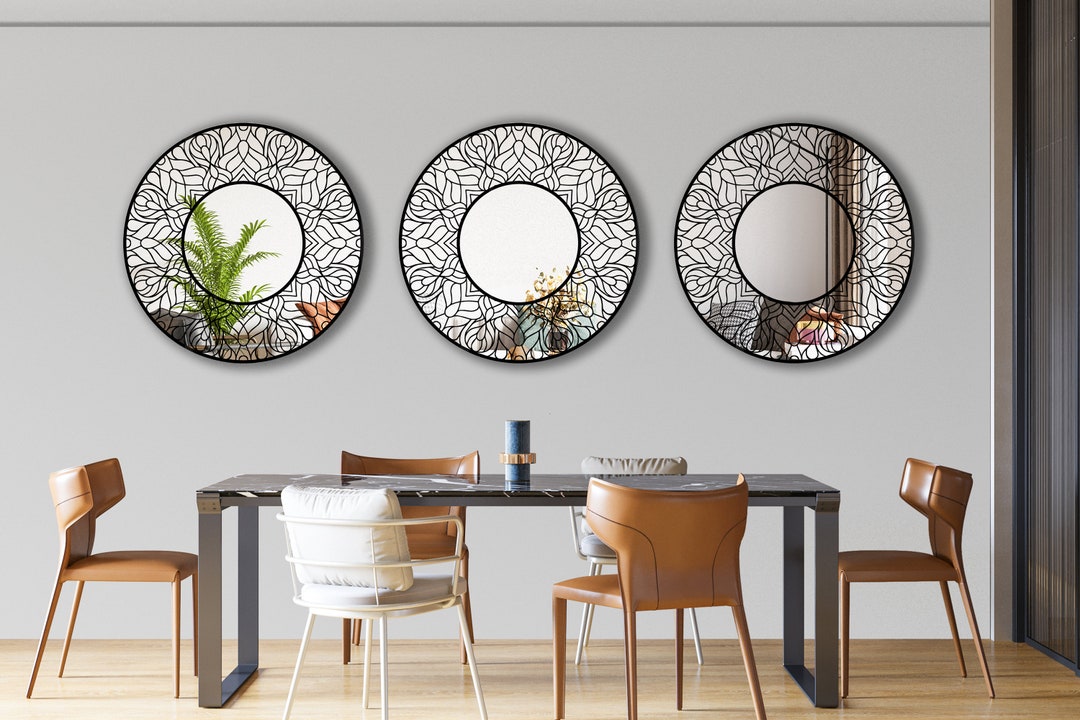In the realm of interior design, mirrors are often celebrated for their ability to enhance light, create a sense of space, and add an element of style to a room. However, when it comes to the principles of Feng Shui—an ancient Chinese practice that emphasizes harmony and balance in living environments—mirrors take on a more nuanced significance. This article explores the role of decorative mirrors in living rooms through the lens of Feng Shui, examining their effects, benefits, and potential drawbacks.
Understanding Feng Shui
Feng Shui, which translates to "wind and water," is based on the belief that our surroundings significantly impact our energy, or "chi." This practice aims to harmonize individuals with their environment by arranging space in a way that promotes the flow of positive energy. In Feng Shui, every element in a room has its own energy, and the placement of these elements can influence the mood, health, and prosperity of the inhabitants.

Mirrors are particularly interesting in Feng Shui due to their reflective properties. They have the potential to double the energy of the space they occupy, which can be both beneficial and detrimental depending on how they are used.
The Benefits of Mirrors in Feng Shui
1. Enhancing Light and Space
One of the primary benefits of this modern wall decor style is their ability to reflect light. In a living room, where natural light is often limited, mirrors can amplify the brightness of the space. This is especially important in Feng Shui, as light is associated with positive energy. A well-placed mirror can create an illusion of a larger room, making the living area feel more open and inviting.

2. Creating Balance
In Feng Shui, balance is crucial. Mirrors can help achieve visual balance in a living room by reflecting elements of the room, such as furniture, artwork, or plants. This reflection can create symmetry, which is aesthetically pleasing and energetically harmonious. For instance, if one side of the room feels heavy with furniture, a mirror can counterbalance that weight by reflecting the lighter side.
3. Expanding Positive Energy
Mirrors can also expand the flow of positive energy. By placing a mirror in a location where it reflects something beautiful, like a garden or a piece of art, you can enhance the good vibes in the space. This reflective quality allows mirrors to bring nature indoors, which is a key aspect of creating a serene and uplifting environment.
Read more: Review: 12+ Crystal Wall Decor Ideas Adding A Touch Of Elegance To Any House
4. Fostering Social Interaction
Mirrors can enhance social interactions by making the space feel more inclusive. A well-placed mirror allows everyone in the room to see each other, fostering communication and connection. In Feng Shui, this encourages a sense of community and togetherness, important elements in any living room.

Potential Drawbacks of Mirrors in Feng Shui
While mirrors can offer numerous benefits, they also have potential drawbacks that should be considered, particularly in the context of Feng Shui.
1. Reflecting Negative Energy
One of the most significant concerns with mirrors in Feng Shui is their ability to reflect negative energy. For example, if a mirror reflects a cluttered area or a sharp corner (known as "poison arrows"), it can amplify that negative energy. This reflection can create feelings of discomfort and anxiety, counteracting the positive effects you might intend.
2. Disrupting Sleep and Relaxation
In bedrooms, mirrors are often discouraged as they can disrupt sleep and relaxation. While this concern is less pronounced in living rooms, it remains relevant if the living space is multifunctional. For instance, if a living room also serves as a sleeping area, a mirror reflecting the bed can create restlessness and unease.
3. Confusing Energy Flow
Mirrors can sometimes confuse the flow of energy in a room. If a mirror is positioned opposite a door, it can reflect energy out of the space rather than allowing it to settle and circulate. This can lead to a feeling of instability and a lack of grounding in the living area.

4. Overwhelming the Space
In a small living room, an oversized mirror can dominate the space, leading to an overwhelming feeling. This can create a sense of chaos rather than harmony, which is counterproductive to the principles of Feng Shui. It’s essential to choose mirrors that are proportionate to the size of the room and the surrounding furniture.
Tips for Using Mirrors in Feng Shui
If you’re considering adding decorative mirrors to your living room, here are some tips to ensure they contribute positively to your space according to Feng Shui principles:
1. Choose the Right Shape
The shape of the mirror can influence the energy it brings into the space. Rounded mirrors are associated with softness and harmony, while angular mirrors can create sharper energy. For a living room, consider using round or oval mirrors to promote a welcoming atmosphere.

2. Mind the Placement
Placement is crucial in Feng Shui. Avoid placing mirrors directly across from doors, as this can lead to energy being reflected out of the room. Instead, position mirrors where they can reflect pleasant views, such as a beautiful garden or artwork.
3. Reflect Positive Elements
Ensure that the mirrors reflect positive aspects of your living room. This could include views of nature, colorful artwork, or even family photos that bring joy. The aim is to amplify the positive energy in the space.
4. Opt for Multiple Smaller Mirrors
Instead of one large mirror, consider using several smaller mirrors. This can create a more dynamic and visually interesting arrangement while avoiding the overwhelming effects of a single large reflective surface.

5. Maintain Cleanliness and Clarity
Mirrors should be kept clean and free from clutter. A dirty or foggy mirror can reflect distorted energy, while a clean mirror allows for clear reflection and enhances the overall energy flow in the room.
Conclusion
Decorative mirrors can be a beautiful and functional addition to living rooms, but their impact on Feng Shui requires careful consideration. While they offer numerous benefits—such as enhancing light, creating balance, and expanding positive energy—they also come with potential drawbacks, including the risk of reflecting negative energy and disrupting the flow of chi.
By understanding the principles of Feng Shui and applying thoughtful placement and design choices, you can harness the power of mirrors to create a harmonious living environment. Ultimately, the key lies in balance: using mirrors wisely to enhance the beauty and energy of your living space while remaining mindful of their reflective nature.
Incorporating mirrors into your living room can be a rewarding endeavor, creating a space that feels open, inviting, and full of positive energy. Whether you opt for sleek modern designs or ornate vintage pieces, the right mirror can transform your living area into a sanctuary of light and tranquility, aligning beautifully with the principles of Feng Shui.





